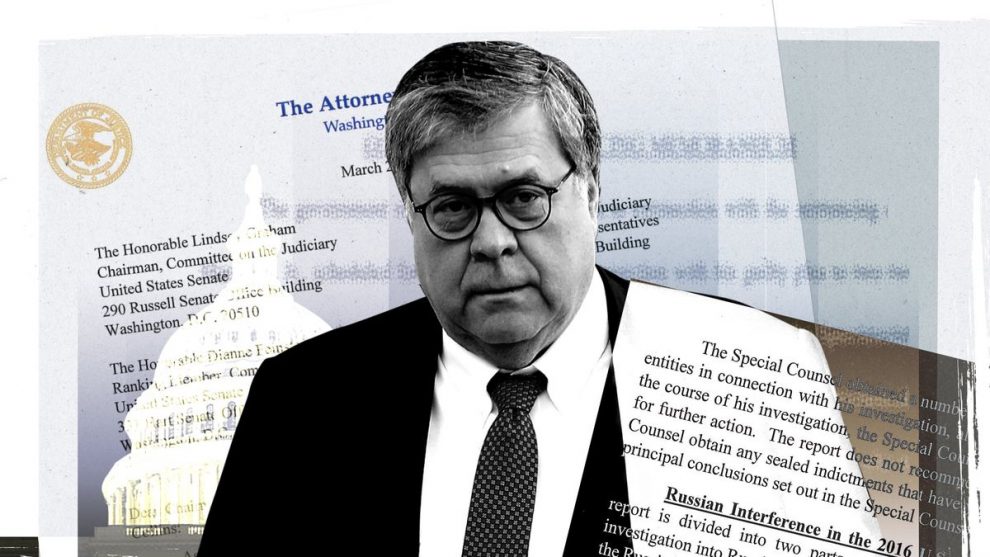America has a crime problem: We treat criminal laws as if they were terms of service on a website — blindly agreeing and praying we’ll never need to know what they say. But it isn’t ordinary Americans who do the clicking; Congress clicks for us.
Worse, most legislators are as blind to what’s inside the laws they enact, or how to enforce them, as your average iTunes user clicking “Yes” on the latest Apple user agreement.
Consider a crime we keep hearing about — obstruction of justice. During his confirmation hearings, Attorney General William Barr sparred with senators about the meaning of the word “corruptly” as it’s used in the obstruction statutes.
Supreme Court blocks California ban on notifying students’ parents about gender transitions
Cornyn wants to work with Trump to fix ‘broken’ immigration system if reelected
BREAKING: US Embassy in Riyadh, Saudi Arabia Hit by Multiple Iranian Drones
Markets Handle Iran Strikes Brilliantly as S&P 500 Has Biggest Intraday Recovery in 5 Months Finishing Positive for the Day
Trump sends official notification to Congress on strikes against Iran
Virginia Mom Allegedly Murdered by Illegal Alien with 30 Priors Only Weeks After Dem Governor Blocks ICE Cooperation
Department of Education Honors Charlie Kirk with Banner as Part of America’s 250th Birthday Celebration: ‘Heroes in American Education’
Musk, xAI tout newest Grok update as only ‘non-woke’ platform: ‘Doesn’t equivocate”
Trump admin warned lawmakers Israel was ‘determined to act with or without us’ before massive Iran strikes
Tarot influencer’s claims in Idaho college murders case spark courtroom reckoning
New Jersey-bound United flight makes emergency landing at LAX after engine fire
What We Know About the African and Extremely Likely Jihadist Mass Shooter in Austin
Radical US mosques honor Iran’s Supreme Leader’s ‘martyrdom’ with memorial services, eulogy: ‘Our leader’
Bill Clinton reveals Trump ‘never said anything’ linking himself to Epstein’s crimes
WWII Hero Awarded Medal of Honor for Refusing to ID Jewish Americans While at Gunpoint: ‘We Are All Jews’
It was just one word, concerning one kind of crime, and yet there was sharp disagreement between the people writing laws and the man who would soon be enforcing them. Special counsel Robert Mueller spent 182 pages analyzing the president’s conduct under those same statutes, only to leave the ultimate question unresolved. When Barr returned for Senate Judiciary Committee hearings, Sen. Dianne Feinstein seemed flummoxed when he explained that instructing someone to lie isn’t necessarily a crime.
For answers, many have turned to the cavalcade of legal analysts on cable news declaring assuredly that the president definitely had, or definitely hadn’t, committed obstruction. Those watching at home had to wonder: Shouldn’t there be an actual answer? Isn’t everyone looking at the same law? Surely America’s most telegenic legal minds and seasoned government officials can definitively answer the binary question of whether the president obstructed justice. But they haven’t. Now some are calling on Congress to answer it in impeachment proceedings.
This tiresome exercise could be undertaken with countless other federal laws. Is it a crime to remove a migratory bird that has taken up roost in your house? It depends. Can you cut the tag off a mattress? Again, it depends. What does it depend on? Well, that depends too. Lawyers are conditioned to accept this, but it’s no less unsettling that, even when the facts are clear, lawmakers, law enforcers, judges and lawyers still can’t agree on what the law itself makes a crime.
Supreme Court blocks California ban on notifying students’ parents about gender transitions
Cornyn wants to work with Trump to fix ‘broken’ immigration system if reelected
BREAKING: US Embassy in Riyadh, Saudi Arabia Hit by Multiple Iranian Drones
Markets Handle Iran Strikes Brilliantly as S&P 500 Has Biggest Intraday Recovery in 5 Months Finishing Positive for the Day
Trump sends official notification to Congress on strikes against Iran
Virginia Mom Allegedly Murdered by Illegal Alien with 30 Priors Only Weeks After Dem Governor Blocks ICE Cooperation
Department of Education Honors Charlie Kirk with Banner as Part of America’s 250th Birthday Celebration: ‘Heroes in American Education’
Musk, xAI tout newest Grok update as only ‘non-woke’ platform: ‘Doesn’t equivocate”
Trump admin warned lawmakers Israel was ‘determined to act with or without us’ before massive Iran strikes
Tarot influencer’s claims in Idaho college murders case spark courtroom reckoning
New Jersey-bound United flight makes emergency landing at LAX after engine fire
What We Know About the African and Extremely Likely Jihadist Mass Shooter in Austin
Radical US mosques honor Iran’s Supreme Leader’s ‘martyrdom’ with memorial services, eulogy: ‘Our leader’
Bill Clinton reveals Trump ‘never said anything’ linking himself to Epstein’s crimes
WWII Hero Awarded Medal of Honor for Refusing to ID Jewish Americans While at Gunpoint: ‘We Are All Jews’
It’s not just a federal problem. Nor is it an exclusively political one. The same day that the special counsel released his report, the highest court in the state of Washington issued an evenly split opinion concerning that state’s own obstruction statute. In it, eight justices of the Washington Supreme Court couldn’t agree whether a man’s refusal to open his door for police constituted a crime. There was no real dispute about the facts. There was a statute written in black and white. Yet the court split 4-4.
This kind of ambiguity is a problem for an executive branch charged with enforcing laws and a judiciary that applies them. It may soon become a very public problem for a Congress trying its hand at both. Mostly, however, it threatens all of us who are presumed to know the law, required to comply with it and barred from arguing ignorance of the law as an excuse.
If Congress really is about to embark on impeachment, perhaps lawmakers will learn a valuable lesson in the process. Let them slog through the muck of their own criminal statutes. Let them display how even they can’t agree on what the text of the law means. Then let America be reminded that we had better follow the untold thousands of laws written by these people or go to prison.
Supreme Court blocks California ban on notifying students’ parents about gender transitions
Cornyn wants to work with Trump to fix ‘broken’ immigration system if reelected
BREAKING: US Embassy in Riyadh, Saudi Arabia Hit by Multiple Iranian Drones
Markets Handle Iran Strikes Brilliantly as S&P 500 Has Biggest Intraday Recovery in 5 Months Finishing Positive for the Day
Trump sends official notification to Congress on strikes against Iran
Virginia Mom Allegedly Murdered by Illegal Alien with 30 Priors Only Weeks After Dem Governor Blocks ICE Cooperation
Department of Education Honors Charlie Kirk with Banner as Part of America’s 250th Birthday Celebration: ‘Heroes in American Education’
Musk, xAI tout newest Grok update as only ‘non-woke’ platform: ‘Doesn’t equivocate”
Trump admin warned lawmakers Israel was ‘determined to act with or without us’ before massive Iran strikes
Tarot influencer’s claims in Idaho college murders case spark courtroom reckoning
New Jersey-bound United flight makes emergency landing at LAX after engine fire
What We Know About the African and Extremely Likely Jihadist Mass Shooter in Austin
Radical US mosques honor Iran’s Supreme Leader’s ‘martyrdom’ with memorial services, eulogy: ‘Our leader’
Bill Clinton reveals Trump ‘never said anything’ linking himself to Epstein’s crimes
WWII Hero Awarded Medal of Honor for Refusing to ID Jewish Americans While at Gunpoint: ‘We Are All Jews’
Impeachment or not, the problem is already on display. We spent two years and tens of millions of dollars on an investigation conducted by dozens of lawyers, all for a non-answer on whether one person committed a particular crime. Meanwhile, hundreds of millions of us could have violated any of the thousands of criminal laws on the books, and we would be hard-pressed to afford just one lawyer to defend us.
To be sure, criminal conduct is nuanced, and it’s impossible to write a perfect statute. But we shouldn’t ignore the danger in a system where lawmakers, the nation’s top prosecutor or a court of last resort can’t agree on whether something is a crime. Hopefully, lawmakers will soon spend less time politicking and more time making the law clearer.
Story cited here.
























